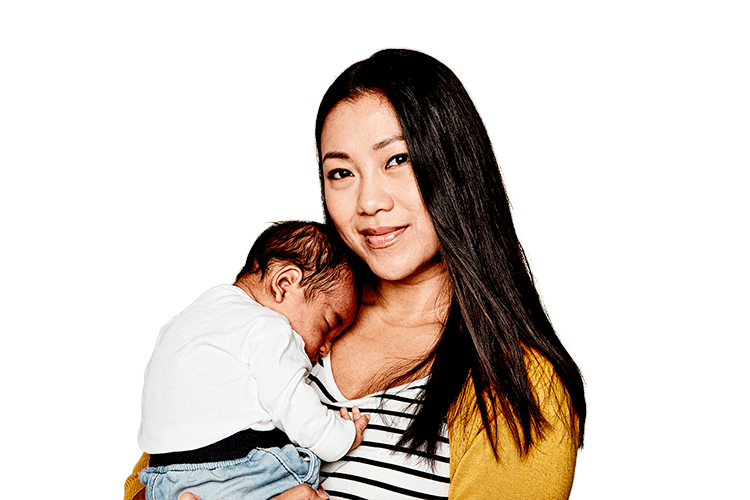Adjusting to life with a baby can be challenging and a rollercoaster of emotions – thanks to sleepless nights, post-partum hormones and finding your feet as a parent.
But those early weeks and months with your baby can be incredibly special. And they are an important time for bonding with your baby.
So with the abundance of (often conflicting) information out there about how much your baby should sleep and feed, how do you know who to trust? How should you go about developing routines with your new baby?
We spoke with paediatrician Professor Harriet Hiscock and get her expert advice on how you can gently find your rhythm as a new mum.

Talk to the experts
Professor Harriet Hiscock says parents should start by looking at evidence-based information. She recommends the government-funded Raising Children Network website as a great online resource for new parents.
There are also many health professionals you can turn to for support. “GPs, maternal and child health nurses, or the family nurses are often a good source of support,” she says. However, you should feel that you can always question their recommendations.
“Parents should feel comfortable asking, ‘Why is this this a good thing to do? And if I don’t do it, is that a problem for me and my baby? And what evidence do you have that it will make a difference and it will be helpful?’“
Sleep and night feedings
Sleep is always a hot topic with new parents – which is almost certainly because sleep deprivation is torture. Yet when it comes to advice on sleep routines, settling techniques, and the amount of sleep a baby needs, the advice can vary greatly. So how much sleep does a newborn baby need to be healthy?
“There is no magic number – that’s the bottom line,” says Professor Hiscock. “Every baby is quite different. And certainly if you have a baby who is feeding well, happy and putting on weight, then they are probably having enough sleep. In those first few months, a baby might be sleeping over a 24-hour period – they might be sleeping 14, 15, 16, 17, 18 hours – and that might be okay if the baby is growing well and happy.”
She also acknowledges that sometimes there is very little we can do to change a newborn’s sleep patterns, and that there is a limit to how much you can keep trying.
“We see a lot of what we call ‘cat-nappers’, that have 30-40-minute sleeps during the day, but then sleep quite well at night. And often there is nothing you can do to shift them. I think sometimes you have to accept that that is how it is,” she says.
She says mums should also be aware that it’s normal to feed a young baby overnight. “Sometimes they need that overnight feed for a long time, and if you’re happy to feed them, then don’t worry about it – just go for it. But if they get to six or seven months and you’re exhausted, then maybe it’s time to try and wean them off that night time feeding,” she says.
“If you’re lucky your baby might start sleeping through and not feeding from around three months, but that tends to be more to do with the baby’s temperament, more than anything you have done or not done.”
The bottom line is, if your baby is happy and thriving, you shouldn’t worry.
How strict is your routine?
While there are many popular sleep methods around that advocate strict routines, Professor Hiscock says if this isn’t working for you, then stop.
“I would advise parents to take a predictable approach, but not a timed approach,” she says. “For example, have a feed, have some play time, and when your baby looks tired then settle them for bed. Try to settle them the same way every time. That consistency does help – babies learn to self-settle, but they don’t necessary do it by a clock.”
Professor Hiscock says it’s certainly fine to go with the flow and follow a baby-led routine in the first three months, particularly if you have a colicky baby who’s very hard to settle.
“After three months, you can have a bit more of a routine developing. As babies get older routines can help them feel comfortable and secure, because they know what’s going to happen. And I think they help many parents to feel calmer, which is then passed onto the baby.”
Look after yourself
If you are experiencing signs of post-natal depression – like tearfulness, loss of appetite, excessive fears, irritability, or feelings of inadequacy, guilt or being unable to cope – it’s important to seek help early. You can reach out to your GP, child health nurse or PANDA (Perinatal Anxiety and Depression Australia).
Ask for help
Professor Hisckock’s main advice for new parents is to not hesitate to ask for help.
“I think we’re very much in a culture where we think we have to do it all ourselves,” she says. “But just think – if a friend reached out to you, you would of course go and help them, and you would enjoy helping. That’s how people will feel helping you.
“I see plenty of mums who just don’t ask for help, and we need to give them permission to.”
Need a little extra support?
Sleep and settling
Our sleep and settling support line, delivered by Tresillian’s specialist nurses, is here to help eligible members with hospital cover, at no extra cost on 1800 973 573.∓
24/7 Medibank Mental Health Support
Medibank members with health insurance can talk with a mental health professional over the phone or online in relation to any mental health or emotional concern at no extra cost.~ Chat online or call 1800 644 325 anytime of the day or night, 7 days a week.
Health Concierge
Eligible members with hospital cover can now talk to a member of our Health Concierge team for advice on how to have a healthy pregnancy, at no extra cost on 1800 789 414.#
Looking for something else?
Visit Medibank Planning, Pregnancy and Parenting for a range of tools and advice to help you at every stage of your pregnancy journey.
Help the way you want it
Contact us
Call us on 134 190 to speak to a consultant. Alternatively, chat to us 24/7 online.
Self-service options
Login to MyMedibank or Download the MyMedibank App for self service options.
Find a specialist
Find a specialist or Member's choice hospital using our find a provider tool.

Things you should know
∓ The Medibank sleep support line is available to eligible members with Bronze hospital cover and above. Excludes Overseas Visitor Health Cover, Working Visa Health Cover and Overseas Student Health Cover (OSHC). Waiting periods may apply. Some referred services may involve out of pocket costs.
~ Some referred services may involve out of pocket costs and waiting periods may apply.
# Health Concierge is available to all eligible Medibank members who hold hospital cover. Excludes Overseas Visitor Health Cover, Working Visa Health Cover and Overseas Student Health Cover (OSHC). Some referred services may involve out of pocket costs.
While we hope you find this information helpful, please note that it is general in nature. It is not health advice, and is not tailored to meet your individual health needs. You should always consult a trusted health professional before making decisions about your health care. While we have prepared the information carefully, we can’t guarantee that it is accurate, complete or up-to-date. And while we may mention goods or services provided by others, we aren’t specifically endorsing them and can’t accept responsibility for them. For these reasons we are unable to accept responsibility for any loss that may be sustained from acting on this information (subject to applicable consumer guarantees).